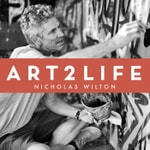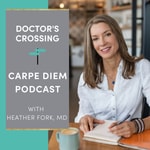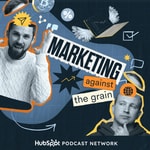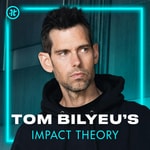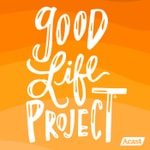The Doctor's Art – Details, episodes & analysis
Podcast details
Technical and general information from the podcast's RSS feed.
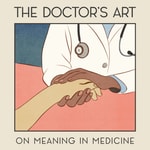
The Doctor's Art
Henry Bair and Tyler Johnson
Frequency: 1 episode/8d. Total Eps: 153

The practice of medicine–filled with moments of joy, suffering, grace, sorrow, and hope–offers a window into the human condition. Though serving as guides and companions to patients’ illness experiences is profoundly meaningful work, the busy nature of modern medicine can blind its own practitioners to the reasons they entered it in the first place. Join resident physician Henry Bair and oncologist Tyler Johnson as they meet with doctors, patients, leaders, educators, and others in healthcare, to explore stories on finding and nourishing meaning in medicine. This podcast is for anyone striving for a deeper connection with their medical journey. Visit TheDoctorsArt.com for more information.
Recent rankings
Latest chart positions across Apple Podcasts and Spotify rankings.
Apple Podcasts
🇨🇦 Canada - medicine
16/06/2025#82🇨🇦 Canada - medicine
17/04/2025#73🇨🇦 Canada - medicine
28/03/2025#99🇬🇧 Great Britain - medicine
15/03/2025#61🇬🇧 Great Britain - medicine
14/03/2025#98🇬🇧 Great Britain - medicine
13/03/2025#47🇬🇧 Great Britain - medicine
12/03/2025#61🇫🇷 France - medicine
24/02/2025#76🇨🇦 Canada - medicine
17/02/2025#86🇨🇦 Canada - medicine
14/02/2025#89
Spotify
No recent rankings available
Shared links between episodes and podcasts
Links found in episode descriptions and other podcasts that share them.
See all- https://988lifeline.org/
1203 shares
- https://www.aa.org/
174 shares
- https://www.who.int/
164 shares
RSS feed quality and score
Technical evaluation of the podcast's RSS feed quality and structure.
See allScore global : 73%
Publication history
Monthly episode publishing history over the past years.
A Physician to the Soul | Miroslav Volf
Episode 127
mardi 27 août 2024 • Duration 01:01:42
What makes a life worth living? This question has animated great thinkers and faith traditions for millennia. Interestingly enough, in our time of rapid globalization, technological advancement, and material abundance, we often seem more unmoored from our conception of the self and its relation to the world than ever before.
Our guest on this episode, Miroslav Volf, has spent his life wrestling with this question of questions and helping others to do the same. Volf is a professor of theology at Yale Divinity School and founding director of the Yale Center for Faith and Culture, and his work explores the intersections of faith, identity, and public life. He is the author of more than 10 books, including the bestselling Life Worth Living: A Guide to What Matters Most (2023), based on one of the most popular courses at Yale University, which he co-teaches. The book, an inquiry into the nature of human flourishing, invites readers to consider wisdom drawn from various religious, philosophical, and literary traditions. He challenges the often superficial metrics of happiness promoted by modern society, urging readers to reflect deeply on the kind of life they want to lead — one that is not just pleasurable or successful by conventional standards, but that is positively shaped by adversity, contemplation, and interconnectedness.
In our conversation, we discuss how growing up as the son of a Pentecostal minister in Former Yugoslavia influenced Volf's relationship with Christian theology, why faith is a “comfortably difficult” thing, why “finding your authentic self” is a problematic concept in modern culture, how social media, divisive political currents, and the relentless drive for productivity distract us from what matters most, and the nobility in pursuing a richer, more intentioned, and just life.
In this episode, you’ll hear about:
3:12 - What Volf’s work as a systematic theologian entails, and key childhood experiences that shaped his relationship with faith
12:18 - The philosophical basis for the Yale class that inspired the book Life Worth Living
20:23 - Why Volf uses Smokey Bear as a representation of the pursuit of a meaningful life
26:53 - Shifting the focus of life from personal desires toward the quest to live by “truth”
40:38 - The inherent challenge in shifting focus away from “I, Me, and Mine”
45:49 - How the search for a meaningful life relates to the experiences of a medical professional
51:42 - Advice for how to add philosophical practices to a busy modern life
Miroslav Volf is the author of 17 books, including Life Worth Living (2023)
Past episodes discussed in this episode:
Episode 95: Shaping a Soul, Building a Self | William Deresiewicz
Episode 21: Pain, Pleasure, and Finding Balance | Anna Lembke, MD
Visit www.TheDoctorsArt.com for transcripts of all episodes. If you enjoyed this episode, please subscribe, rate, and review our show, available for free on Spotify, Apple Podcasts, or wherever you get your podcasts. If you know of anyone working in health care who would love to explore meaning in medicine with us on the show, send an email to [email protected].
Copyright The Doctor’s Art Podcast 2024
Inside the World of Outbreak Response | Syra Madad, DHSc, MSc, MCP
Episode 126
jeudi 22 août 2024 • Duration 42:05
Most people shudder at the idea of an infectious disease outbreak — patients stricken with a mysterious illness, hospitals overflowing, and cities going into lockdown. But for Syra Madad, DHSc, MSc , MCP, rushing into such a scenario, donned in a hazmat suit, to control the chaos has been a dream since childhood. Today, she is an epidemiologist, biosecurity advisor, and a pathogen preparedness expert who serves as Senior Director of the System-Wide Special Pathogens Program at New York City Health and Hospitals, which operates the municipal health care system of New York City.
Over the course of our conversation, Dr. Madad shares what excites her about the work of infectious disease control, why she believes we have emerged from the Covid-19 pandemic worse prepared for the next pandemic, how scientists and doctors can better communicate with the public in the absence of clear data, the importance of utilizing trusted messengers in the community to fully deploy the power of public health, and more.
In this episode, you’ll hear about:
2:09 - How a movie led Dr. Madad to become an infectious disease preparedness expert
6:54 - An overview of Biosafety levels (BSL)
9:30 - Moments in Dr. Madad’s career when disease containment went well and moments when it did not.
12:27 - How Dr. Madad mentally and emotionally manages the heavy weight of often-lethal infectious diseases
18:05 - Dr. Madad’s opinion on how COVID-19 policies were handled
24:02 - Dr. Madad’s personal thoughts on the potential origins of COVID-19
26:55 - What concerns Dr. Madad most about future pandemics and how we can make positive steps toward recovering trust in science
35:40 - Dr. Madad’s advice for those considering a career in public health or infectious diseases
Dr. Syra Madad appears in the Netflix special Pandemic: How to Prevent an Outbreak.
Dr. Syra Madad can be found on Twitter/X at @syramadad.
Visit our website www.TheDoctorsArt.com where you can find transcripts of all episodes.
If you enjoyed this episode, please subscribe, rate, and review our show, available for free on Spotify, Apple Podcasts, or wherever you get your podcasts. If you know of a doctor, patient, or anyone working in health care who would love to explore meaning in medicine with us on the show, feel free to leave a suggestion in the comments or send an email to [email protected].
Copyright The Doctor’s Art Podcast 2024
Living Well Without Free Will | Robert Sapolsky, PhD
Episode 117
mardi 18 juin 2024 • Duration 53:17
Most of us take free will for granted — from the biggest of life decisions to choosing an ice cream flavor, we are generally capable of freely deciding how to think and how to behave without outside influence. But Robert Sapolsky believes our decisions cannot be disentangled from our genetics, environment, and neurobiology. In other words, to him, free will does not exist.
Dr. Sapolsky, a neuroscientist and primatologist at Stanford University, is a leading thinker on the biology of stress, human behavior, neurodegenerative diseases, and the science of free will and determinism. He is the author of multiple bestselling books, including Why Zebras Don't Get Ulcers (1994), Behave: The Biology of Humans at Our Best and Worst (2017), and Determined: A Science of Life Without Free Will (2023). His works have been featured widely in the popular press, from National Geographic to The New York Times.
Over the course of our conversation, Dr. Sapolsky presents his arguments against free will, along the way making detours through chaos and complexity theory, philosophy, ethics, and neuroscience. He shows how subtracting free will from the way culture thinks about crime, mental health, and human development have resulted in more humane health, justice, and educational systems. Finally, we contemplate together what human flourishing even means in the context of a life without free will.
His ideas have profound implications not just on our society, but also on our understanding of human nature, challenging our perceptions and provoking deep reflection on how we navigate the choices in our lives.
In this episode, you’ll hear about:
3:08 - How Dr. Sapolsky chose a career straddling both neuroscience and primatology
5:04 - The moment when Dr. Sapolsky realized he did not believe humans have free will
16:16 - How society becomes more humane when free will is factored out
23:29 - The deep implications that free will and determinism could have on criminology
34:13 - How a belief in a lack of free will can negatively affect motivation on a societal scale
43:11 - What does human flourishing look like in a world without free will?
48:07 - The best moments in life in which to utilize this understanding of free will
Dr. Robert Sapolsky has authored numerous publications, a full bibliography of his works can be found here.
Dr. Robert Sapolsky can be found on Instagram at @robert.sapolsky.
Works and past episodes discussed:
What’s Expected of Us by Ted Chiang
Episode 79: Transcendence in the Age of Science | Alan Lightman, PhD
Visit our website www.TheDoctorsArt.com where you can find transcripts of all episodes.
If you enjoyed this episode, please subscribe, rate, and review our show, available for free on Spotify, Apple Podcasts, or wherever you get your podcasts.
Copyright The Doctor’s Art Podcast 2024
Facing the Rarest of Cancers | Katie Coleman
Season 1 · Episode 27
mardi 6 septembre 2022 • Duration 48:56
On New Year's Eve of 2020, at the age of 29, Katie Coleman was diagnosed with metastatic renal oncocytoma, a type of kidney cancer so rare that she is the only known case in the United States and one of only a handful around the world. The sheer uniqueness of her situation resulted in a prolonged course of prognostic and therapeutic uncertainty. Thanks to the work of oncologists at the National Cancer Institute and MD Anderson Cancer Center, Katie is now in remission. Today, she is a patient advocate who passionately supports other patients through their cancer journeys. In this episode, Katie joins us to share her incredible story, her experiences with grief, uncertainty, and hope, and her lessons learned on finding joy and meaning in life.
In this episode, you will hear about:
- Katie’s backstory and the events leading up to her diagnosis - 1:50
- The experience of being diagnosed with one of the rarest cancers in the world - 3:58
- How Katie’s oncologists discussed this unusual diagnosis with her - 10:42
- The experience of receiving treatment with the goal of prolonging life, rather than curing the disease - 13:06
- How co-host Dr. Tyler Johnson communicates issues of serious illness with his patients - 15:38
- How the uncertainty around a terminal cancer prognosis impacts the way patients approach living their lives - 22:21
- How Katie’s changing prognoses have altered her life plans - 28:53
- The wisdom on living well one gains from facing a life-limiting illness - 34:32
- Lessons on hope in the face of uncertainty - 39:55
- The various ways clinicians can open up and connect with their patients on a human level - 44:14
Katie’s story has been profiled by the National Cancer Institute, NBC News, and the Today Show.
You can follow Katie on Twitter @KayDAustin
Katie is also an active content creator and patient advocate on Youtube, TikTok, and Instagram.
Visit our website www.TheDoctorsArt.com where you can find transcripts of all episodes.
If you enjoyed this episode, please subscribe, rate, and review our show, available for free on Spotify, Apple Podcasts, or wherever you get your podcasts. If you know of a doctor, patient, or anyone working in health care who would love to explore meaning in medicine with us on the show, feel free to leave a suggestion in the comments or send an email to [email protected].
Copyright The Doctor’s Art Podcast 2022
A Physician-Engineer and His Patient Stories | Bryant Lin, MD, MEng
Season 1 · Episode 26
mardi 30 août 2022 • Duration 42:50
Technological advancements have enabled us to accomplish medical miracles through novel medical devices, algorithms, and digital tools. At the same time, the exponential entanglement of tech with healthcare has led many clinicians to feel disconnected from the human element of medicine. Here to discuss this conundrum is Bryant Lin, MD, MEng, the director of Medicine and the Muse, the medical humanities program at Stanford Medical School, and a mechanical engineer by training who focuses on medical device development. Dr. Lin also conducts research in Asian population health and is the cofounder of Stanford’s Consultative Medicine Clinic, which evaluates patients with medical mysteries. In today’s episode, Dr. Lin shares his unique perspective at the crossroads of technology and the humanities, and discusses how storytelling can be a powerful instrument to keep physicians grounded in what truly matters for their patients.
In this episode, you will hear about:
- How an early interest in engineering led Dr. Lin to medicine - 1:42
- A poignant letter Dr. Lin received from one of his long-term aging patients that reaffirms why his medical career is meaningful - 4:10
- A discussion of how medical bureaucratization has stolen away much of the human connection that underpins fulfilling medical work - 7:39
- How Medicine and the Muse, the medical humanities program at Stanford, helps clinicians connect with the meaning in medicine - 12:40
- What Dr. Lin hopes to achieve through teaching medical humanities to future clinicians - 25:45
- How storytelling helps healthcare providers better connect with their patients - 27:28
- How Dr. Lin integrates storytelling into medical device design, and why it is imperative to not allow technology to distance physicians from their patients - 31:24
Dr. Lin manages the forthcoming digital medical humanities newsletter Panacea Health.
Visit our website www.TheDoctorsArt.com where you can find transcripts of all episodes.
If you enjoyed this episode, please subscribe, rate, and review our show, available for free on Spotify, Apple Podcasts, or wherever you get your podcasts. If you know of a doctor, patient, or anyone working in health care who would love to explore meaning in medicine with us on the show, feel free to leave a suggestion in the comments or send an email to [email protected].
Copyright The Doctor’s Art Podcast 2022
A Doctor's Journey from the Edge of Death | Rana Awdish, MD
Season 1 · Episode 25
mardi 23 août 2022 • Duration 48:50
Rana Awdish, MD was on the last day of her critical care medicine training when her life changed forever. Seven months pregnant at the time, Dr. Awdish abruptly found herself in a life threatening crisis when a previously undiagnosed liver tumor suddenly ruptured. She was rushed to the ICU of her own hospital, where she came unimaginably close to death multiple times. Despite this tragic event, she survived thanks to the incredible work of her medical team. Today, Dr. Awdish is the author of the acclaimed memoir In Shock, which recounts her time as an ICU patient. She is also the Medical Director of the Pulmonary Hypertension Program at Henry Ford Hospital in Detroit, Michigan, and Medical Director of Care Experience for the Henry Ford Health System. In this episode, she shares what she has learned from her experiences about compassion, hope, and improving empathetic communication in health care.
In this episode, you will hear about:
- How a family ailment inspired Dr. Awdish to pursue a medical career - 2:10
- An riveting personal account of the catastrophic medical event that befell Dr. Awdish - 4:17
- A discussion of the learning curve in medicine and the need to create safe spaces for physicians to admit ignorance - 12:13
- The fascinating and unsettling experience of being a highly-trained physician and a critically-ill patient at the same time, and how this experience showed her the way our current medical culture disempowers patients - 15:17
- Dr. Awdish’s reflections on the antagonistic environment of her prolonged hospital stay - 20:19
- A discussion of hope, concept often misunderstood by physicians as running counter to realistic expectations - 27:37
- The intense and unexpected role of spirituality in Dr. Awdish’s critical care experience - 32:14
- Navigating the medical profession while confronting suffering and not burning out - 34:37
- A discussion of Dr. Awdish’s profound essay The Shape of the Shore about the first year of the COVID-19 pandemic in Detroit - 37:36
- Dr. Awdish’s advice to new physicians and students to help them stay connected to their work and to see the humanity in their patients - 44:33
Dr. Rana Awdish is the author of:
In Shock: My Journey from Death to Recovery and the Redemptive Power of Hope, a memoir about the harrowing events discussed in this episode and the revelations she attained by going through them.
The Shape of the Shore, an essay about working in the ICU during the first months of the COVID-19 pandemic.
Dr. Johnson mentions the essay The Learning Curve by Dr. Atul Gawande.
Follow Dr. Awdish on Twitter @RanaAwdish.
Visit our website www.TheDoctorsArt.com where you can find transcripts of all episodes.
If you enjoyed this episode, please subscribe, rate, and review our show, available for free on Spotify, Apple Podcasts, or wherever you get your podcasts. If you know of a doctor, patient, or anyone working in health care who would love to explore meaning in medicine with us on the show, feel free to leave a suggestion in the comments or send an email to [email protected].
Copyright The Doctor’s Art Podcast 2022
Purpose and Justice on the Pandemic Frontlines | Thomas Fisher, MD
Season 1 · Episode 24
mardi 16 août 2022 • Duration 48:46
Imagine showing up for work every day for a year, knowing full well that each day you risk contracting a potentially devastating disease with unknown long-term consequences. That's exactly what Thomas Fisher, MD went through, as he documents vividly in his recent book, The Emergency: A Year of Healing and Heartbreak in a Chicago E.R., which delves into what it was like fighting COVID-19 on the frontlines in 2020. Dr. Fisher, an emergency physician at the University of Chicago Medical Center, former healthcare executive, and former White House Fellow, has dedicated his life to caring for his community, the black population of Chicago's South Side. In this episode, he recounts harrowing stories from the emergency room, gives an impassioned critique of a health care system with too little space for doctors to provide the care their patients need, and shares a renewed vision of healthcare as a foundation of social justice.
In this episode, you will hear about:
- What motivated Dr. Fisher to write his book, The Emergency, a riveting first-hand account of the first year of the COVID-19 pandemic - 2:09
- The uncertainty and terror physicians faced at very beginning of the pandemic - 5:29
- An intimate picture of how emergency physicians approached the first COVID-19 patients - 9:45
- How an upbringing in Chicago’s South Side propelled Dr. Fisher into a career in healthcare, and how the reality of inequitable systems has shaped his medical practice - 13:10
- A discussion of the concept of “heroism” in the context of frontline healthcare workers - 20:35
- How Dr. Fisher used letters addressed to patients as a narrative device in his book to explore social injustices that affect individual health - 30:50
- Dr. Fisher’s reflections on maintaining a connection to the meaning of his work despite the seemingly insurmountable systemic challenges that he recognizes - 35:57
- Practical advice for clinicians on making space for patient care within a rushed healthcare environment - 42:28
Dr. Fisher is the author of The Emergency: A Year of Healing and Heartbreak in a Chicago E.R.
Follow Dr. Fisher on Twitter @TFisherMD.
Visit our website www.TheDoctorsArt.com where you can find transcripts of all episodes.
If you enjoyed this episode, please subscribe, rate, and review our show, available for free on Spotify, Apple Podcasts, or wherever you get your podcasts. If you know of a doctor, patient, or anyone working in health care who would love to explore meaning in medicine with us on the show, feel free to leave a suggestion in the comments or send an email to [email protected].
Copyright The Doctor’s Art Podcast 2022
Stewarding the Vulnerable Moments | Audrey Shafer, MD
Season 1 · Episode 23
mardi 9 août 2022 • Duration 45:10
What is it like to comfort patients in the moments before they surrender consciousness to undergo surgery? What can the humanities teach us about being present for a patient when they are at their most vulnerable? As an anesthesiologist and founding director of Medicine and the Muse, Stanford Medicine’s health humanities program, Audrey Shafer, MD has spent her career pondering and addressing these questions. In this episode, Dr. Shafer discusses how her exploits in the humanities have shaped her career in medicine, gives us an intimate and vivid picture of the vital work anesthesiologists do, and shares what her recent personal experiences with cancer have taught her about what it means to truly care for patients.
In this episode, you will hear about:
- How growing up in an artistic household initially pushed Dr. Shafer away from the arts and toward a medical career - 1:51
- Why Dr. Shafer chose to become an anesthesiologist - 5:51
- Dr. Shafer’s discovery of the medical humanities and how she would later create the first program of its type at Stanford Medicine - 8:57
- A discussion of what the medical humanities are and a defense of its value - 12:00
- Reflections on the profound privilege of being an anesthesiologist and a medical educator - 17:45
- A behind-the-scenes look at an anesthesiologist’s work - 25:02
- Dr. Shafer’s recent cancer diagnosis and her treatment journey - 34:29
- Advice for clinicians and medical students about seeing patients’ illnesses within the greater context of their lives - 41:15
Follow Dr. Shafer on Twitter @AudreyShafer.
You can peruse the Literature Arts & Medicine magazine here.
Visit our website www.TheDoctorsArt.com where you can find transcripts of all episodes.
If you enjoyed this episode, please subscribe, rate, and review our show, available for free on Spotify, Apple Podcasts, or wherever you get your podcasts. If you know of a doctor, patient, or anyone working in health care who would love to explore meaning in medicine with us on the show, feel free to leave a suggestion in the comments or send an email to [email protected].
Copyright The Doctor’s Art Podcast 2022
Lessons from a Lifelong Patient Turned Oncologist | Eric Winer, MD
Season 1 · Episode 22
mardi 2 août 2022 • Duration 36:30
Born with hemophilia in a time before effective therapies existed and having experienced treatment complications including hepatitis C and HIV, Eric Winer, MD spent much of his childhood and young adulthood in and out of the hospital. Today, he is the Director of Yale Cancer Center and President of the American Society of Clinical Oncology (ASCO), the largest organization of clinicians caring for cancer patients. An internationally renowned expert in breast cancer, his research has immensely impacted how breast cancer is now treated. In this episode, Dr. Winer shares his path to oncology and his insights from being a lifelong patient on stigma, compassion, and empathy.
In this episode, you will hear about:
- How growing up with hemophilia led Dr. Winer to the field of medicine - 1:50
- The patient that cemented Dr. Winer’s dedication to oncology as his life’s work - 7:55
- Dr. Winer’s reflections on how his experiences as a patient shape his work as a doctor - 12:52
- Facing the reality of caring for patients with terminal illness - 18:21
- How Dr. Winer grounds the care he provides in the humanism of each patient - 23:49
- Dr. Winer’s mission and vision as president of the American Society of Clinical Oncology - 25:49
- How leading by example is critical to cultivating a strong, respectful, and collaborative institutional culture - 31:02
- Dr. Winer’s advice to medical students and new clinicians on maintaining a connection to meaningful work - 33:12
Visit our website www.TheDoctorsArt.com where you can find transcripts of all episodes.
If you enjoyed this episode, please subscribe, rate, and review our show, available for free on Spotify, Apple Podcasts, or wherever you get your podcasts. If you know of a doctor, patient, or anyone working in health care who would love to explore meaning in medicine with us on the show, feel free to leave a suggestion in the comments or send an email to [email protected].
Copyright The Doctor’s Art Podcast 2022
Pain, Pleasure, and Finding the Balance | Anna Lembke, MD
Season 1 · Episode 21
mardi 26 juillet 2022 • Duration 50:22
Our modern world grants us unprecedented access to high-reward, high-dopamine stimuli—not just drugs, but also food, news, shopping, sex, gaming, social media, gambling, and more. But psychiatrist Anna Lembke, MD argues that this society-wide overindulgence in pleasure threatens to lead us to deeper pain. Dr. Lembke is the director of the Addiction Medicine Service at Stanford Medicine and is the author of two bestselling books, Dopamine Nation and Drug Dealer, MD. As one of the first doctors to sound the alarm on the opioid epidemic in America, she's an expert on the issue and has advised policymakers at the highest levels of government. In this episode, Dr. Lembke describes her work treating all kinds of addiction, discusses her deep concern with the overconsumption of pleasure in our culture, and shares what we can all do to renew meaning and connectedness in our lives through balancing pain and pleasure.
In this episode, you will hear about:
- What first drew Dr. Lembke to a medical career and how she initially discovered psychiatry - 2:13
- Why Dr. Lembke dedicates herself to addiction medicine, and how her philosophy can help others find meaningful work - 9:16
- The historical shift, with the advent of the opioid epidemic, to understanding addiction as a medical condition instead of a moral or personal failing - 12:53
- Reframing addiction as a medical diagnosis and approaching patients facing addictive disorders with compassion - 17:58
- How flaws in contemporary medical practice and misaligned incentives for doctors contributed to the opioid crisis - 24:15
- A discussion of Dr. Lemke’s book Dopamine Nation, including how easy access to pleasure causes addictagenic responses in nearly every aspect of our lives - 29:32
- How humans can reconnect with meaning despite living in a culture that often substitutes meaning with cheap pleasure - 34:15
- Dr. Lembke’s advice to all clinicians for how to better connect with patients - 45:20
Tyler refers to the essay “I Used to be a Human Being” by Andrew Sullivan.
Visit our website www.TheDoctorsArt.com where you can find transcripts of all episodes.
If you enjoyed this episode, please subscribe, rate, and review our show, available for free on Spotify, Apple Podcasts, or wherever you get your podcasts. If you know of a doctor, patient, or anyone working in health care who would love to explore meaning in medicine with us on the show, feel free to leave a suggestion in the comments or send an email to [email protected].
Copyright The Doctor’s Art Podcast 2022



